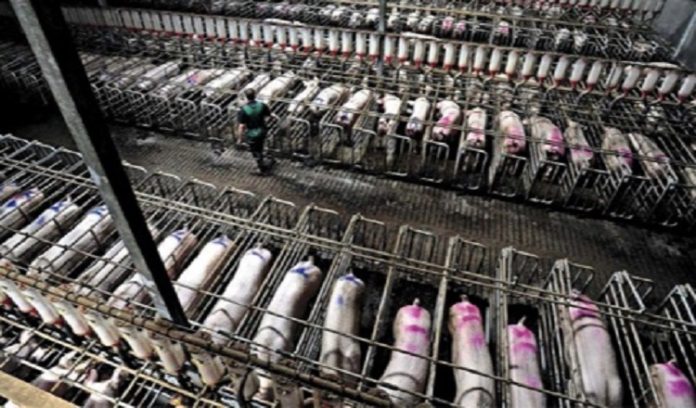The Iowa Department of Natural Resources (DNR) issued the following updates Friday for owners and operators of livestock production facilities.
Sign up now for concrete training—design and construction for Animal Feeding Operations
Make sure the next deep-pit hog barn you construct is built to last by using the right materials in the right quantities. Contractors, consultants, livestock producers and geotechnical experts should plan now to attend one of seven concrete construction seminars held from Feb. 24 to March 3 across the state.
Learn more about DNR specifications, what to do if you have to substitute materials, and why following the DNR’s construction design statement (CDS) is important for the long life and function of the barn. DNR engineers who specialize in animal feeding projects will lead the discussion. They’ll share design and construction considerations for alluvial soils, flood plains, flood plain permits and karst soils — including some stunning photos of where construction failed.
Each two-hour session will be held at a DNR field office. Please contact Paul Petitti at Paul.Petitti@dnr.iowa.gov or 712-262-4177 to reserve your spot.
- Feb. 24 – 10 a.m., Spencer
- Feb. 24 – 2 p.m., Spencer
- March 1 -10 a.m., Atlantic
- March 1 – 2 p.m., Des Moines
- March 2 – 9 a.m., Washington
- March 2 – 1 p.m., Manchester
- March 3 – 9 a.m., Mason City
March 1 deadline to complete MAC renewals
Reminder: Certificates expire annually March 1 for commercial manure applicators. Confinement site certificates are viable for three years ending Dec. 31, with a two-month grace period for renewals. Commercial and confinement manure applicators who are renewing their certification need to complete the training or testing and pay fees prior to March 1 to avoid a $12.50 late fee. The late fee does not apply to new applicants for a certificate. See the next article for training and testing options.
MAC applicator training wrapping up
Manure applicator certification training for confinement site applicators is wrapping up, with the last live session scheduled for Feb. 28. Two dry/solid manure workshops are also available — designed to meet the needs of confinement or commercial applicators who handle dry or solid manure. They are scheduled for Feb. 21 in Adair County and Feb. 22 in Buena Vista County.
If unable to attend a live session, commercial and confinement applicators may watch a video during monthly scheduled dates and times at their local Iowa State University Extension and Outreach office. Find training and viewing opportunities at your local Extension office. Although not required, registration ensures that there will be space and training materials available.
Or consider taking advantage of DNR’s online training and fee paying option. Find more information about the certification program at www.iowadnr.gov/
Finally, applicators may take and pass a test in lieu of training. Please schedule a testing time at your local DNR field office.
Protect water quality – Be careful with winter manure application
Reminder for all manure applicators: winter manure application may result in runoff and lost nutrients. So be careful if manure can’t be injected or incorporated because of field conditions.
For confinements, state law limits liquid manure application on frozen or snow-covered ground from now until April 1. Confinement producers must contact their regional DNR field office prior to applying manure if they’re faced with an emergency situation.
Find out more at DNR News.
Eighty-eight counties opt in for Master Matrix
Once again this year, 88 of 99 counties notified the DNR that they plan to use the master matrix to evaluate construction permit applications and proposed locations for animal confinements during 2017 and January 2018. Supervisors in Davis, Decatur, Des Moines, Keokuk, Lee, Mahaska, Osceola, Plymouth, Wapello, Warren and Washington counties did not pass a construction evaluation resolution, so they will not be using the master matrix this year.
Find more news and information about the matrix, including a map of participating counties by searching for Master Matrix at www.iowadnr.gov/afo.
eMMP – A better way to handle manure management plans
Check out the new eMMP AFO webpage for ongoing progress reports on efforts to make online submittal of the manure management plan short forms possible.
New this month for those who prefer paper: Find an updated version of the MMP short form for annual updates (DNR 542-8162) in Word and pdf versions. The new form combines the fee form and the former short form, making it easier to calculate the maximum animal unit capacity and fees when submitting the annual update. The DNR will continue to offer the option of submitting the paper form with no change in the process.
See www.iowadnr.gov/emmp for recommendations from a December work group on how electronic MMP submittals and fee processing could occur. Find the group’s report and request for enhancements as they work toward on online solution.
Stay tuned as NRCS changes soil loss equation
NRCS is planning to replace the Universal Soil Loss Equation (RUSLE2) with WEPP, the Water Erosion Prediction Project model, possibly in the next six months. This change will impact livestock owners who are required to submit manure management plans (MMPs) or nutrient management plans (NMPs) to the DNR. Currently, RUSLE2 is required in MMPs and NMPs as part of the Phosphorus Index.
Once NRCS begins using WEPP, the DNR plans to accept plans using either RUSLE2 or WEPP during a transition period. After the transition period ends, all plans will need to be updated with WEPP. It is anticipated that training opportunities for MMP preparers will be available during the transition period. Stay tuned for more developments.


















